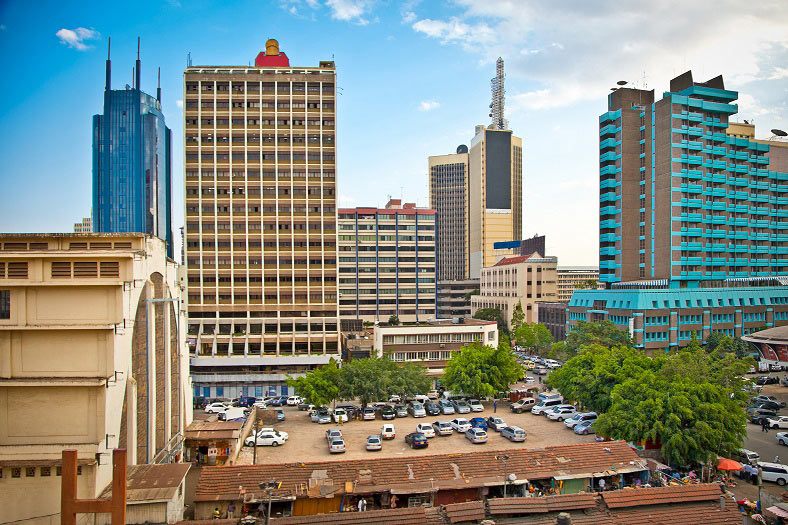

Kenya- The Commercial Powerhouse of East Africa

Located in East Africa, Kenya lies on the Equator bordered by Somalia, Ethiopia, Sudan, Uganda, Tanzania and the Indian Ocean. It covers an area of some 592,909 sq. km and has a population of approximately 30 million people. Much of the country, especially in the north and east, is arid or semi-arid. The country has been politically stable since it gained its independence in 1963, and the recent peaceful transition of power to the new administration has been widely praised as an impressive example of African democracy in action. The landslide victory of President Mwai Kibaki and the National Rainbow Coalition (NARC) in presidential and legislative elections in December 2002 marked the beginning of a new political era by ending almost four decades of one-party rule. The new administration has embarked on policies that focus on economic development, building up the country's infrastructure, generating employment and foreign investment.
Moves to liberalize the economy taken over the last ten years have laid the groundwork for an investment-friendly environment in Kenya. The economic recovery strategy is targeted to achieve an 8% growth rate and industrial status for Kenya by 2025, creating 500,000 jobs a year in the process. The Central Bank of Kenya has pledged to pursue “a stable monetary policy, which accommodates the highest economic growth rate possible", while keeping inflation low and stable.
Kenya is an important player in East and Central Africa. Strategically placed, with a major port, Mombasa, and well-developed financial markets, the country has the makings of a regional services hub in banking, information and transportation.
The country's membership in the East African Community (with Tanzania and Uganda) and the Common Market for Eastern and Southern Africa (COMESA) makes it an attractive base for foreign investors and companies looking to access the East and Central African market. Through Kenya, an investor can access the COMESA market with over 380 million people. Kenya and the three East African countries recently signed the protocol on the East African Customs Union creating a common external tariff to be applied to goods imported from outside the region and also harmonized the tariff rates between them. This is one of the 3 steps towards an eventual political union of the three East African countries. The Kenya government is taking various steps to create an enabling environment in order to encourage both foreign and domestic investment in line with the economic recovery strategy paper, which is based on the twin concepts of democracy and empowerment.
As a member of NEPAD (New Partnership for Africa's Development), Kenya has shown its commitment to good governance by being one of the first members of NEPAD to accede to the Peer Review Initiative of NEPAD. The African Peer Review Mechanism (APRM) is an instrument voluntarily acceded to by Member States of the African Union as an African self monitoring mechanism. The primary purpose of the APRM is to foster the adoption of policies, standards and practices that lead to political stability, high economic growth, sustainable development and accelerated sub-regional and continental economic integration through sharing of experiences and reinforcement of successful and best practice, including identifying deficiencies and assessing the needs for capacity building.
As part of their efforts to increase Kenya's competitiveness as an investment destination, the Government has also embarked on rebuilding the dilapidated infrastructure to encourage both domestic and foreign investment. Parts of these efforts have involved streamlining the operations of each of the important sectors in the economy including transport, energy, road and railway infrastructure etc. Kenya still has one of the best developed business infrastructures in the East and Central African region.
Kenya's industrial sector has grown substantially over the years and contributed about 13 per cent of the Gross Domestic Product as at the year 2003. The manufacturing sector is composed of medium and large-scale enterprises with major foreign multinational companies from the European Union, United States of America, India, China, Gulf and Asia.
Kenya has rich tourist attractions and over the years, tourism has overtaken agricultural products (tea, coffee and Horticulture) to be the highest foreign exchange earner. Recently doing Business in Kenya for travel advisories, specifically by the United States of America, have largely been ignored and it is predicted that the number of tourists to the country will hit 1 million as a result of efforts by the government, the Kenya Tourist Board and the private tourism industry investors to aggressively market the country both locally and internationally, changing the traditional tourist sources to the far east and China.
Kenya's attractiveness as an investment destination is supported by various factors that favor both local and foreign investment including:
-

Political stability
-

Stable economic policy environment
-

Competitive investment incentives
-

Guarantees to investors
-

Strategic location and preferential access to regional and international markets
-

Business friendly tax system
-

Emerging financial market
-

Simple investment procedures
-

Relatively developed social and physical infrastructure
-

Abundant, highly developed and mobile human resource
-

One-stop facilitation services by Investment Promotion Centre and Export Processing Zones Authority
-

Abundant natural resources.
The Government of Kenya encourages both local and foreign direct investment. Multinational companies make up a large percentage of Kenya's industrial sector. It is Government policy to encourage investment that will produce foreign exchange, provide employment and promote backward and forward linkages and transfer of technology. The only significant sectors in which investment (foreign and domestic) is constrained are those where state corporations still enjoy a statutory or de facto monopoly. These are restricted almost entirely to infrastructure (e.g. power, mail service, fixed-line telecommunications and ports). Even in these sectors, ongoing commercialization and economic reform is expanding the room for private business. The Government has undertaken several measures to create an enabling environment, including:
-

Abolishing exchange controls
-

Removing price controls
-

Freeing the Kenya Shilling exchange rate to be market driven
-

Abolishing import licensing
-

Opening up of the capital markets to foreign participation
Attractive incentives are availed to all investors through generous investment and capital allowances, tax remission, manufacturing under bond status (MUB), export processing zones status, double taxation agreements, protection and promotion of investment agreements, bilateral investment treaties and trade agreements Opportunities abound for investments in Kenya's agricultural, industrial, and commercial sectors e.g. horticulture, agro-processing, textiles and apparels, plastics and pharmaceuticals, power & energy, tourism, ICT operations and financial services. In the recent past, mining, oil & gas has also proved to be an attractive investment opportunity as is the case with the mining of titanium in Coast province and the exploration for oil and gold by international companies. The Kenyan government organized a National Investment Conference in November 2003 followed by the International Investment Conference in March 2004. These events were meant to showcase Kenya, as an ideal investment location so as to improve the much needed local and foreign investment. The International Investment Conferences, promoted locally and internationally as “Kenya 2004", focused on the Government of Kenya's high priority areas of infrastructure development and agroprocessing.
It offers an attractive combination of growing economic infrastructure and a vibrant market economy.
It produce and export some of the world's best tea and coffee, among other agricultural products. We are the communications hub for East Africa, and the main transport hub to most of the African countries in the region.
A wide range of international and foreign firms, including the United Nations, maintain a regional headquarters in Kenya. It has an abundance of natural resources and educated manpower. It is estimated that our GDP was $29.3 billion in 2007 and annual growth rate was 6.1% (2006).
Kenya is open for business and investment. As a multi-party, democratic and developing country, Kenya has enormous potential as an investment destination.
Please Select an Option
-
Exhibiting
-
Visiting
-
Information

Expogroup
Expogroup is a full service exhibition organiser with over 28 Years experience in International trade exhibitions. Our current portfolio includes 28 annual exhibitions from a diverse range of industries being held across the Middle East & Africa.
EXPOGROUP © 1996 - 2024 | Privacy policy

